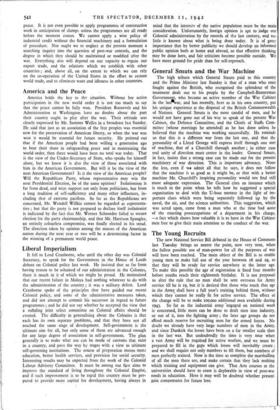General' Smuts and the War Machine
The high tribute which General Smuts paid to this country and the Prime Minister last Sunday is that of a man who OnCe fought against the British, who recognised the splendour of • the treatment dealt out to his people by the Campbell-Bannerman Government, who became an active member of the War Cabinet in the ladawar, and has recently, here as in his own country, put his unique experience at the disposal of the British Commonwealth of Nations. General Smuts is the most candid of men, and he would not have gone out of his way to speak of the present War Cabinet, the Defence Committee, and the Chiefs of Staffs Com- mittee (whose meetings he attended) as he has done unless he believed that the machine was working successfully. He reminds us that this is a different war from the last one, and that the personality of a Lloyd George will express itself through one sort of machine, that of a Churchill through another ; in either case real unity of direction must centre in the leader. General Smuts, in fact, insists that a strong case can be made out for the present machinery of war direction. This is important advocacy. None the less, even if we admit all that he says, it does not follow that the machine is as good as it might be, or that with a better machine Mr. Churchill's inspiring personality would not find still more adequate expression. The General cites an instance which is much to the point when he tells how he suggested a special organisation to deal with the U-boat menace in the light of im- portant clues which were being separately followed up by the naval, the air, and the science authorities. This suggestion, which was acted upon, came from a man who at the time had none of the exacting preoccupations of a department in his charge, —a fact which shows how valuable it is to have in the War Cabinet men free to give their main attention to the conduct of the war.


























 Previous page
Previous page